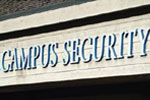
Higher Education Better Security
How confident are you that the security offered at your child’s college or university is adequate to protect him or her? Surely, that’s one of the talking points you considered when choosing higher education.
- By Ralph C. Jensen
- Jul 01, 2011
My sons, all grown and graduated, didn’t talk much about this issue when deciding which university to attend. It wasn’t an issue that entered my mind, either.
Today’s parents, however, must consider campus security as a vital part of the learning experience. Today, parents have options and assistance from the university. Campus police take an active role in guiding and informing parents on what their children can expect.
“Parents mainly ask if the campus is safe, and what the bigger issues we face might be,” said Troy Lane, chief of police at the University of Wyoming, Laramie. “During most of the month of June, we hold orientations for new students and parents of new students. The police department is represented in both orientations. We avoid many questions because we tell them up front about who we are, what we do and what safety measures are in place.”
One question that comes up more and more often concerns residence halls, where students may be the most vulnerable and where updates are underway at Miami University in Oxford, Ohio.
“The university will be installing new proximity card locks on every residence hall room,” said John M. McCandless, chief of police at Miami University. “This takes us away from standard keys and will be beneficial. With the old locks, students would regularly leave their doors unlocked, and we would have many thefts as a result. “The amount of crime alerts we issue for burglaries should also drop. We also have a swipe card system on the entrances to the residence halls that helps to enhance security.”
While policing a campus may seem different from monitoring the surrounding community, both Lane and McCandless say that the services the campus law enforcement provide are similar to municipal services; policing a campus does include monitoring Saturday afternoon football games, but otherwise the job is much like community policing, they say.
“The university hosts many events annually, each bringing a different set of challenges,” McCandless said. “We coordinate a lot of moving parts, and we could not do it without our area law enforcement partners.”
The University of Wyoming handles such special events in a similar manner, but it also depends upon the event. Law enforcement can be available on an on-call basis or they are heavily involved in the preparations. Lane said they have run the gamut of events on the university’s campus, including small dances, political debates and even presidential visits.
Much like their counterparts in municipal and county law enforcement, campus police crave technology. McCandless noted that 28 years ago an electric typewriter was high-tech. Times have changed. Today, law enforcement officers rely on technology to work in a smarter way. Everything from digital fingerprinting to license-plate readers has changed the way police complete their mission. Other technology in use at the University of Wyoming includes the deployment of text tip programs, social media, in-car cameras and video surveillance systems. This technology isn’t cheap.
“These systems do require maintenance, backup and updates,” Lane said. “We find ourselves counting on in-house, self-trained experts or relying on vendors for servicing.” Higher education also finds itself adhering to federal guidelines to inform students, staff and faculty if there is an emergency on the campus. Mass notification systems vary, and law enforcement’s use of particular systems also varies. At the University of Wyoming, campus police employ a text alert program, mass e-mail notification and a public address system. At Miami University, law enforcement has partnered with E2Campus for text messaging, but the department also uses VoIP phones and message boards. Police also rely on additional campus resources, such as faculty and staff. “One of the things that hasn’t changed is the fact that we need our community to be a partner (eyes and ears), and we constantly ask them to call if they see anything suspicious,” McCandless said. “Other departments on campus are great partners—grounds and physical facilities are an example of folks on campus that we count on.” The University of Wyoming is always looking to involve the community, including text tips, Silent Witness e-mails, crisis intervention teams and the ongoing reminder that public safety is everyone’s responsibility, including students’ and parents’.
This article originally appeared in the July 2011 issue of Security Today.
About the Author
Ralph C. Jensen is the Publisher/Editor in chief of Security Today magazine.